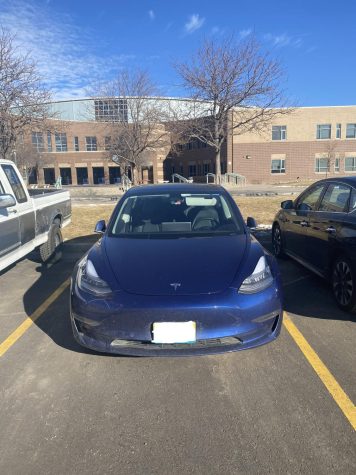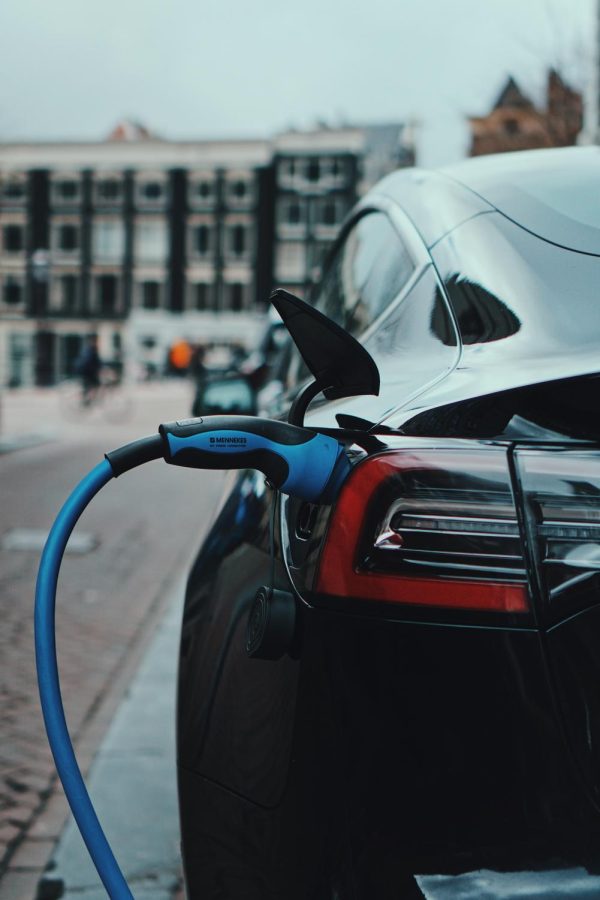Electric Cars–They’re Not That New
Photo by Precious Madubuike on Unsplash
Electric vehicles are getting increasingly faster at charging. For example, the RIVIAN R1T will charge 140 miles in less than 10 minutes.
February 2, 2022
It’s 1886. Carl Benz has just applied for a patent on a “vehicle powered by a gas engine.” It’s official, patent #37,435 is the world’s first registered automobile. The Benz Patent Motor Car would set in motion a new industry fundamental to the advancement of mankind.
Fast forward 136 years, it’s 2022, and a fully electric powered truck has won Motor-Trends 2022 truck of the year. The Rivian R1T is one of the latest emerging automobiles in the race to control the electric car market.
It is commonly believed that fuel injection engine-powered vehicles are the oldest and most fundamental basis for the automobile industry, yet this is incorrect. In 1832, Robert Anderson, a Scottish inventor, created an “electric car.” This new tech was more of a parlor trick, as it moved incredibly slowly and could not be recharged. However, this new idea for transportation would lay the groundwork for a booming industry in the modern market.
Motivations for these new innovations are wide-spread. Creating an energy efficient and environmentally friendly vehicle not only possesses benefits for long term livelihood of mankind in terms of battling the self-inflicted climate emergency, but also presents potential financial gains. For consumers wanting new electric vehicles, there are often federal incentives or subsidies that they can take part in, which can take thousands of dollars off of a purchase price.

The electric vehicle industry also receives interest from investors and larger companies outside the industry. Warren Buffet is a great example of a major investor who poured money into electric cars with his investment into the Chinese Company BYD.
“The future for electric cars is bright, and companies are beginning to produce more electric cars than gas cars, so the industry is on the rise,” Grady Burkgren (10) said.
Burkgren, a high school investor, went on to say that he believes it is a good industry to follow because the whole market is following a continental shift towards cleaner transportation services.
While fully electric vehicles, like the Rivian R1T, are being produced in record numbers, the hybrid platform is also notable. This technology focuses on combining a partially electric motor with a gasoline engine, thus increasing the gas-mileage substantially. In 2022, Hyundai released the 2022 Ioniq Hybrid, which presents a gas-mileage of 60 mpg. Vehicles like these are often a transition step for those venturing into electric cars, or a final step for those looking to pay much less on gas.

“It was better for the environment, and we were worried about our carbon footprint,” Connor Swanson (10) said.
These hybrid vehicles are often much more trusted by consumers than fully electric vehicles because of their reliable range in fuel. However, electric manufacturers are making large strides in increasing electric vehicle range. For example, Tesla’s Model S holds a range of 373 miles with the base package.
“The fundamental goodness of Tesla … so like the ‘why’ of Tesla, the relevance, what’s the point of Tesla, comes down to two things: acceleration of sustainable energy and autonomy,” Tesla CEO Elon Musk said in an interview with CNBC.
Already established companies are being challenged by new companies in the electric market, and these new companies are finding large support from many investors.
Rivian, the manufacturer of the R1T, holds a 1.3 billion dollar investment from Amazon, and the automobile company Ford also has a 12% stake in it. This support from high-level companies in the modern market sets a strong foundation for competition to arise in the industry, thus evolving the electric car as a whole.
For the future, there are an infinite number of questions. Future generations might buy into electric vehicles or they might buy into another. It all depends on the support from the consumer.
“I would consider owning an electric car,” Connor Swanson (10) said. “I think they are a new innovation and are very cool technology.”



